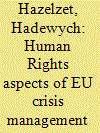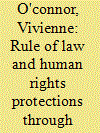| Srl | Item |
| 1 |
ID:
075710


|
|
|
|
|
| Publication |
2006.
|
| Summary/Abstract |
When UNMIK took control of Kosovo, the mission was hampered by the slow deployment of UN Civilian Police (CIVPOL). While its main task was to establish law and order, CIVPOL also played an important role in enforcing human rights. This article analyses the performance of CIVPOL in the four stages of its work to enforce and promote human rights: executive policing; capacity building of the domestic law enforcement body, Kosovo Police Service (KPS); the transition of executive policing from CIVPOL to KPS; and monitoring of the KPS. In addition to its slow deployment, CIVPOL faced several problems in accomplishing its mission such as a lack of understanding of the local law and the participation of officers from countries with poor human rights records. Nevertheless, CIVPOL has made an invaluable contribution to promote and protect human rights in Kosovo.
|
|
|
|
|
|
|
|
|
|
|
|
|
|
|
|
| 2 |
ID:
075713


|
|
|
|
|
| Publication |
2006.
|
| Summary/Abstract |
How do we explain under which conditions the EU is likely intervene in one crisis situation and not in another? To what extent have human rights considerations been factored into these operations thus far? This article seeks to answers these questions and describes the decision-making process with respect to EU involvement in crisis management operations and the instruments at the disposal of the EU, with a particular focus on human rights policy. An overview and analysis of current and past civilian and military crisis management operations points to three factors that help to explain EU involvement in crisis situations, namely: norms, interests and institutions. It concludes with suggestions to better integrate human rights into future operations.This article is written in a personal capacity and does not reflect EU positions.
|
|
|
|
|
|
|
|
|
|
|
|
|
|
|
|
| 3 |
ID:
075709


|
|
|
|
|
| Publication |
2006.
|
| Summary/Abstract |
In Kosovo during 1999-2002 a large military peacekeeping force (KFOR) and human rights mission (OSCE) appeared to be working towards the same goals. The military and human rights experts had previously worked together during the Kosovo Verification Mission. However, cooperation proved difficult when it came to two critical issues: protection of minorities and the use of arbitrary detention. Human rights officers and the military actually found themselves on opposite sides on the detention issue. The article argues that this was partly due to the specific circumstances in Kosovo, including the lack of an overall strategy in both KFOR and the OSCE. Nevertheless, general lessons can be drawn, such as the need for civilian control over military forces and the need for human rights officers to focus solely on their area of expertise.
|
|
|
|
|
|
|
|
|
|
|
|
|
|
|
|
| 4 |
ID:
075712


|
|
|
|
|
| Publication |
2006.
|
| Summary/Abstract |
Despite repeated calls for integration of human rights in peace operations, human rights remain marginalized at both UN Headquarters and in the field. This article argues that serious consideration of human rights at both levels is fundamental to give effect to the integration imperative. At UN Headquarters, it is pivotal that Security Council resolutions provide express provisions of international human rights law and that DPKO, DPA and the Special Committee on Peacekeeping Operations strengthen cooperation with the Office of the High Commissioner for Human Rights. In the field, the UN may wish to undertake a comparative review as to which institutional design of peace operations may best further integration. If universal human rights is to provide the basis for effective integration at both levels, it is also necessary that UN Member States honour their commitment to strengthen the OHCHR.
|
|
|
|
|
|
|
|
|
|
|
|
|
|
|
|
| 5 |
ID:
075714


|
|
|
|
|
| Publication |
2006.
|
| Summary/Abstract |
While 'peace' and 'justice' advocates share ultimate goals, the short-term concerns and strategies of practitioners in the two fields may differ dramatically. The potential contradictions of pursuing peace and justice are a particular challenge in the context of large-scale conflict, whether internal or international. Both mediators and human rights advocates could use more humility and less arrogance, since neither group can create world (or even local) peace on their own. This article argues that the two disciplines need to build on their shared values of impartiality and independence, while maintaining the distinctive features of each approach, including their concern with ensuring that the less powerful are adequately protected and represented. Neither group should be tolerant of injustice. It concludes that collaboration, or at least mutual appreciation, is certainly feasible, particularly as greater emp
|
|
|
|
|
|
|
|
|
|
|
|
|
|
|
|
| 6 |
ID:
075707


|
|
|
| 7 |
ID:
075706


|
|
|
| 8 |
ID:
075708


|
|
|
|
|
| Publication |
2006.
|
| Summary/Abstract |
This article examines the implications for peace support forces of the extra-territorial applicability of human rights treaties, focusing in particular on positive obligations to secure rights. It argues that the manner in which the International Court of Justice has interpreted the criterion of 'effective control' for the purposes of the applicability of occupation law and of human rights law reflects a growing tendency towards an adoption of 'convergence' principles with regard to the relationship between international humanitarian law and international human rights law, and that this is likely to have significant implications for peace support forces.
|
|
|
|
|
|
|
|
|
|
|
|
|
|
|
|
| 9 |
ID:
075711


|
|
|
|
|
| Publication |
2006.
|
| Summary/Abstract |
This article examines the inter-relationship between the rule of law, criminal law reform and international human rights norms and standards in post-conflict societies from a theoretical as well as a practical perspective. In several peace operations, both national and international actors have faced significant challenges in reforming the domestic criminal law framework. Reflecting upon these challenges, many practitioners have called for the creation of 'law reform tools'. With the aim of providing such tools, the Model Codes for Post-conflict Criminal Justice Project has developed a set of model criminal laws. The model codes have been drafted in a manner that is fully compliant with international human rights norms and standards in the field of criminal proceedings. The article discusses how such model codes may meaningfully contribute to domestic criminal law reform efforts, not as a panacea but a start for enhanced human rights protection in post-conflict states.
|
|
|
|
|
|
|
|
|
|
|
|
|
|
|
|